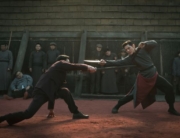
Christopher Nolan’s Tenet is a palindrome in both its title and mechanical function. Like most Nolan films, this vague description will only make sense once you’ve seen the entire story front to back and realize how his time-bending fantasy-techno-realism comes full circle. But like most puzzles, this requires keeping viewers in the dark for most of its first half, deliberately prioritizing mystery and spectacle over character.
Like all good spy thrillers, the action begins with a covert CIA ops team breaching a crowed opera hall in Ukraine to rescue a political asset. It’s the most anti-social distancing opening Nolan could have given a blockbuster meant to save cinema after a months-long lockdown, and watching Tenet in a limited-seating New Jersey theater, I couldn’t help but notice the irony.
Naturally, the mission goes wrong and our lead, played by John David Washington, is tortured by Russian operatives before seizing his opportunity to take a cyanide capsule. As it turns out, this was all part of a test to prepare him for an even greater threat: World War III, but from the future literally bleeding into the past. His keys to navigating this operation are a word, Tenet, and the story’s central sci-fi gimmick: time inversion.
This plot device gives Nolan’s spy movie its flavor, with the sci-fi existing not in gadgetry but existential stakes. As explained by a scientist, Laura (Clémence Poésy), certain metallic and material objects can travel backwards in time due to futuristic entropy-inverting technology, a process where moving “normally” for them means the world is simply working in reverse. “Don’t try to understand it, feel it” is her advice to Washington—whose character is simply called the Protagonist—and maybe the viewer, even if the logic makes one cross-eyed. Find the supplier of inverted weaponry—the one communicating with the future—and you stop the end of the world.
From there matters become very Bond-like. The Protagonist receives his own Felix Leiter in a British handler named Neil (Robert Pattinson), converses with an Indian arms dealer (Dimple Kapadia) in Tenet’s service, and works with a fixer (Yesterday’s Himesh Patel) to break into an art vault. All his paths lead him to thwart ruthless Russian oligarch Andre Sator (Kenneth Branagh) from executing the future’s mission. He gains entry through Sator’s wife, Kat (Elizabeth Debicki), who would like to see her abusive husband dead. The Protagonist manages to make contact in hopes of understanding how Sator’s gained all this cataclysmic knowledge.
This is a solid setup, but there’s some frustration in how Nolan deliberately distills his characters to their most basic personality traits. He’s more interested in time inversion’s logic than those discovering it, so everyone feels like cogs in the puzzle machine. The Protagonist is literally his namesake, Neil is the dapper one, and Kat has a child to garner our sympathy— we’re interested less in who they are than the situation they’re all caught up in.
It’s not helped by the fact that certain dialogue sequences are inaudible over the sounds of either crashing waves or Ludwig Göransson’s score—it’s like trying to listen over a loud vacuum cleaner. The intrigue becomes far more elaborate than most characters realize, and those who know more can’t say so to ensure events happen as planned, so you just need to go along for the ride.
However, I can’t say these flaws completely bring Tenet down. It’s still an engaging ride and a reminder of why Nolan’s name alone can sell original, big-budget Hollywood investments. The visual effects are stellar, and the set pieces demonstrate his commitment to insane practical stunts, including a fantastic highway heist, a Boeing crash, and a surreal fight between the Protagonist and an inverted figure that’s like watching an action scene on play and rewind.
While the first act was confusing in places, its midpoint, in typical palindrome fashion, reveals so many big “ah-ha” moments that it left me far more confident that Nolan had thought his sci-fi logic out. Things both make sense and don’t because the film’s manipulation of time plays with our understanding of linearity, allowing cause and effect to play out simultaneously. It is, like most of Nolan’s filmography, original, but that doesn’t mean flawless.
I don’t think Tenet needed to be shackled to theaters as Nolan so insisted—fans in droves should not risk their lives for any release. But if you like the director’s work, then you’ll find enjoyment here. It’s expertly shot, well-acted, and assertive in execution, though perhaps a bit too wordy in how often it describes the kinetic spectacle, even by “thinking man” sci-fi standards. Nolan has always been obsessed with time, but in this particular film, time feels like a more fleshed-out character than the people living in it.






Leave A Comment